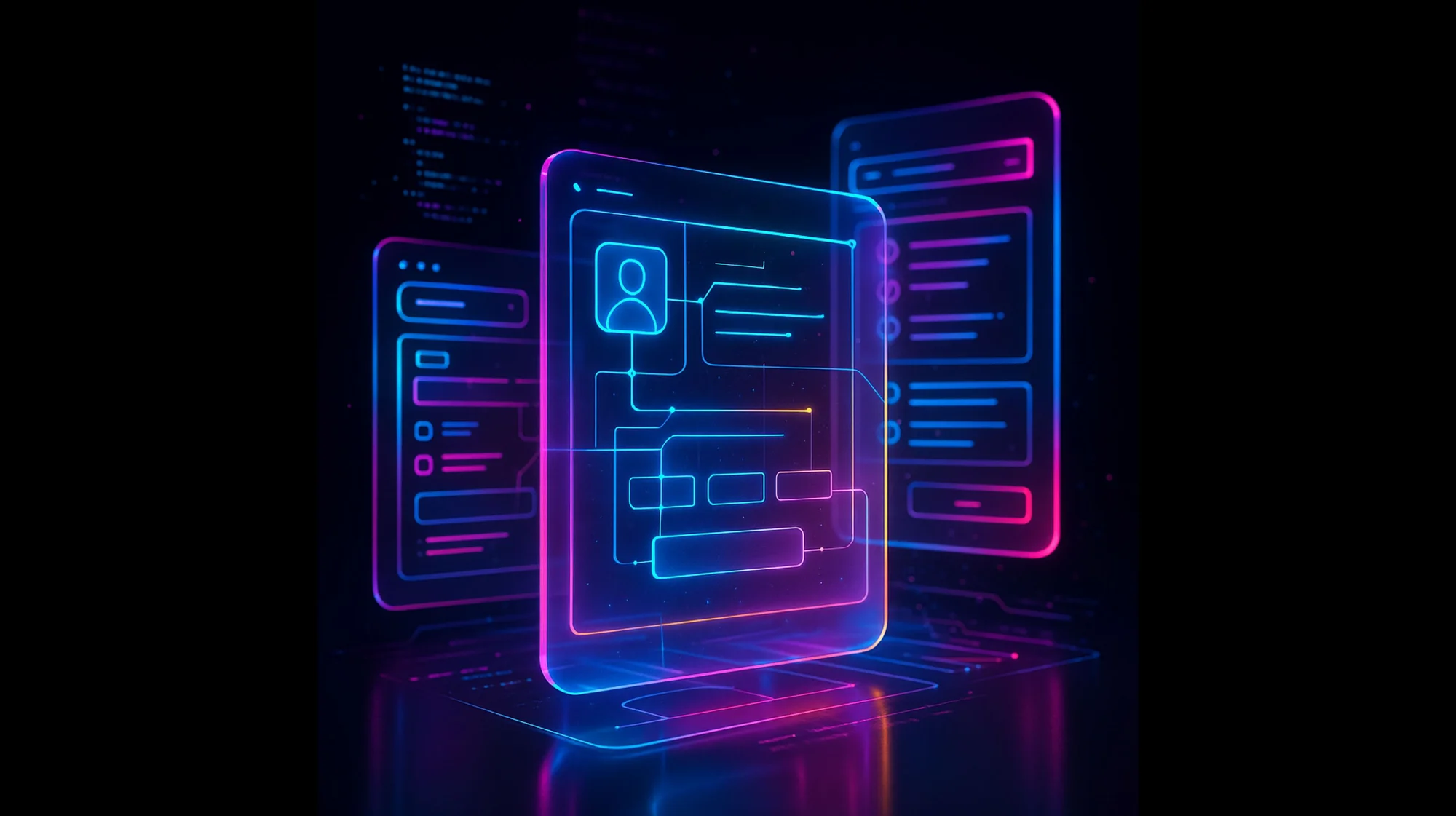We’ve all been there: Asking our favorite genAI tool a work-related question, only to get a useless answer back. That’s because AI tools like ChatGPT, Claude, and Gemini work with static data snapshots, lack context, and don’t understand your business or its data.
If you ask a genAI tool without a web search tool about recent events before its cutoff date (when the model's training data was last updated), you’ll get an incorrect answer.
But now, ChatGPT and other tools have web access, and conversational workflows have evolved. Ask an LLM a question, it searches the web, and it sources the answer.
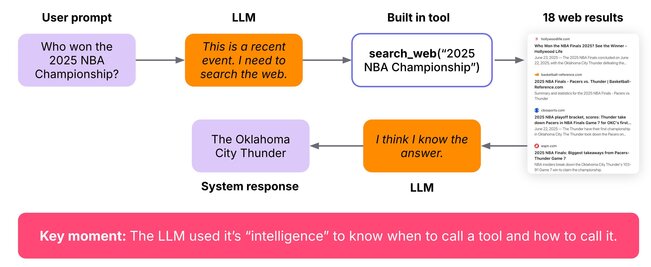
But what if the answer to your question isn’t on the web? What if the answer is hidden within your CRM, on your Google Drive, or within your own software platform? This is where Model Context Protocol (MCP) fits in.
Model Control Protocol, explained
MCP provides external information, tools, and data sources that an AI agent or LLM can use beyond its own internal training. It is an open standard that allows AI agents and LLMs to access and use your data, external tools, and services without custom integrations.
This universal framework represents a fundamental shift in how AI systems connect with business data. Unlike traditional APIs that require custom integrations, MCP standardizes the process. AI agents can interact with any MCP-compatible service, without needing prior knowledge of its specifics.
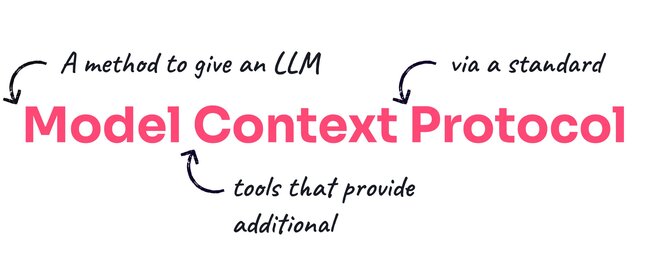
Let’s talk about context
We’ve already covered that LLM base models have fixed knowledge. They only know what it was trained on until its cutoff date, like ChatGPT 4o’s June 2024 cutoff.
To get around this, you can provide LLMs with additional context—usually a chunk of recent conversation, documents, or instructions—to answer questions that are not in their base model. It’s like the model’s short-term memory: everything inside the context window is "visible" to the model, and everything outside is forgotten.
Common types of context include:
- User instructions: The user’s prompt
- System instructions: Guidance by the AI tool’s creator
- Long-term memory: Information the AI tool remembers about the user
- Recent conversation: The previous prompts + AI tool’s response
- Reasoning: Thinking tokens created by reasoning LLMs, like GPT-5, Gemini 2.5 Pro
- Attachments: Documents, images, spreadsheets, slide decks, etc.
- RAG: Results of a semantic search query on a large database
- Built-in tool responses: Web search, code interpreter
- MCP tool responses: From available MCP servers
Here’s how a typical prompt flows with a knowledge cut-off:
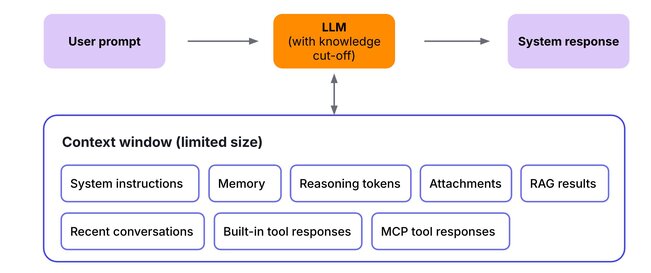
Now, let’s talk about MCP servers and tools
Think of MCP servers as the connectors that live between your AI agents and your business systems. Each server comes loaded with specific tools, the actual functions that let your AI search within databases, grab files from Google Drive, or pull customer data from your CRM.
To support this, there are two flavors of MCP servers:
- Local servers handle the sensitive stuff on your computer, including file creation and system access.
- Remote servers connect to cloud services like Notion, GitHub, Slack, and whatever else you're using at work. These are the ones you will typically use.
Tools can take optional arguments, and respond with structured data in the form of JSON. You can use these tools for retrieving information and taking action. It’s like adding arms and legs to LLMs.
Here’s how MCP works in the context of an LLM or genAI prompt:
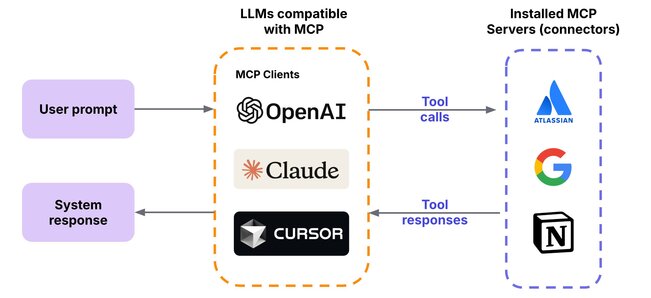
How we’re using MCP to build AI agents at Pendo
Today, we’re using MCP to power Pendo’s new AI agent. Instead of manually digging through dashboards or spending hours creating reports, Pendo’s agent connects directly to your product analytics, user feedback, and behavioral data to get answers to your questions.
It’s convenient, but it also surfaces buried insights you might miss otherwise. It suggests guides you haven't built, highlights patterns across quantitative and qualitative data, and pushes you toward areas of your product analytics you might not normally explore.
MCP unifies 100% of your business data
The real power of MCP becomes apparent when AI can correlate information across multiple systems simultaneously. Imagine asking "What's the user sentiment around our new feature?" and getting an answer that combines:
- Quantitative usage data showing adoption rates
- Qualitative feedback revealing user frustrations
- Account-level data showing which customer segments are most affected
- Historical patterns indicating whether this sentiment trajectory is typical
This comprehensive view was previously impossible because the data lived in silos that couldn't communicate effectively.
MCP helps AI understand context and the “why”
MCP enables AI to understand not just what you're asking, but why you're asking it.
When a product manager queries account information before a customer call, MCP-powered AI recognizes this context and automatically surfaces the most relevant insights: feature adoption patterns, power user identification, recent engagement trends, and potential expansion opportunities.
MCP can act on your behalf
Perhaps most revolutionary is MCP's ability to enable AI that can take action, not just provide information. When you need "a list of customers to talk to about a new feature," MCP allows AI to:
- Query usage databases to identify relevant user segments
- Cross-reference with customer feedback to find engaged users
- Check account data for expansion potential
- Generate segments of users to reach out to
Creating an AI-ready data ecosystem at your enterprise
MCP is a shift from AI that about your work to AI that does your work. As MCP adoption grows, we're beginning to see the emergence of a new ecosystem of AI-powered business intelligence.
Companies across industries are recognizing that true competitive advantage comes from having AI that can better understand and act on that data. Next, companies are pursuing cross-platform AI collaboration, where AI systems can share insights and coordinate actions across different business functions.
As we build our own AI agents, we’re seeing this firsthand. As the standard for how AI agents connect to enterprise tools, the companies that figure out MCP first will have a serious advantage in how quickly they can turn data into decisions.
Interested in seeing how this plays out? Join our AI agent waitlist.
![[object Object]](https://cdn.builder.io/api/v1/image/assets%2F6a96e08774184353b3aa88032e406411%2F39f3ccde352b460cbf348ccc952054cd?format=webp)
